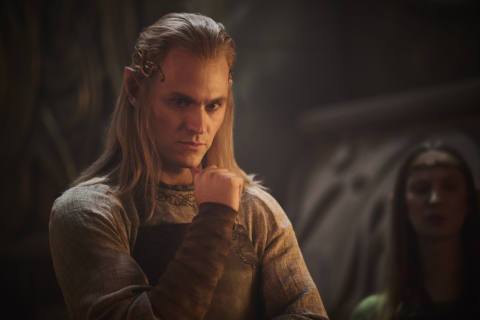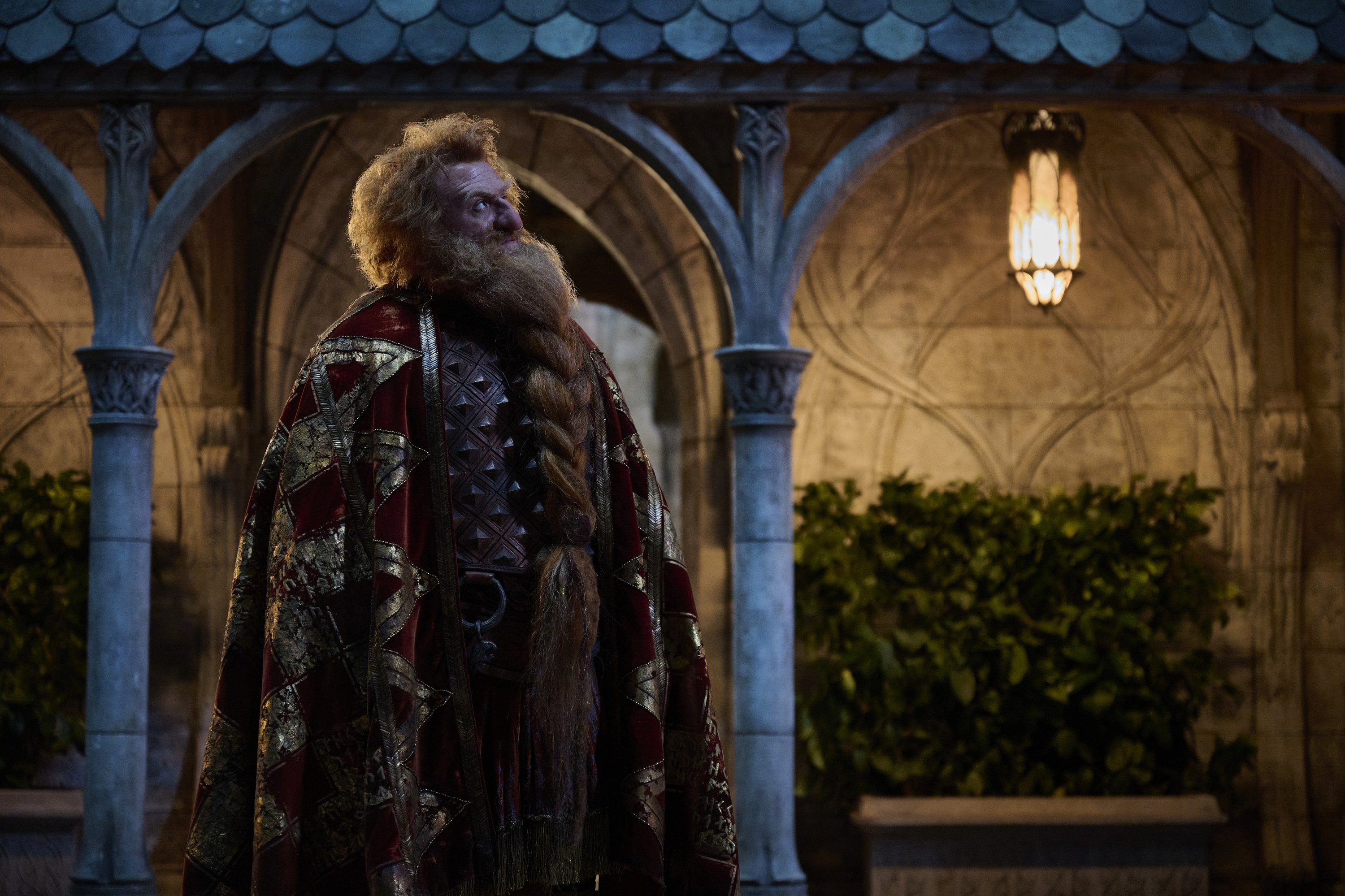
For a story built on temptation, The Lord of the Rings is largely defined by its clear-cut morality. The same can’t be said of The Rings of Power, which has leaned into the moral ambiguity and questionable choices of its sprawling ensemble pretty much from the jump. And so it is with season 2’s fifth installment, which continues the show’s recent run of form by devoting most of its run time to people doing the right thing for the wrong reasons. The result is more than just the strongest hour of TV the season has mustered so far (although it’s certainly that). It’s a springboard for episode 5 to illustrate the seductiveness of the Rings of Power — and the baddie behind them — in ways that Lord of the Rings media rarely (if ever) does.
[Ed note: This article contains spoilers for The Lord of the Rings: The Rings of Power season 2, episode 5.]
J.R.R. Tolkien’s original Middle-earth lore is pretty clear on the top-level details of Sauron’s long con. The dark lord hoodwinks Celebrimbor and the other elf-smiths with his “mission from God” Annatar schtick, and suckers everyone else in by playing to their arrogance, avarice, or both. As a backstory for The Lord of the Rings, this more than does the trick. However, as a story in its own right, it leaves plenty of room for fleshing out. Even in his “fair” guise, how did Sauron keep the famously wise elves on the hook long enough to crank out so many rings? And how did he convince the infamously insular dwarves to accept them?
It’s questions such as these that episode 5 devotes most of its run time to answering — and to directors Louise Hooper and Sanaa Hamri and writer Nicholas Adams’ credit, answering pretty well. It gives us an up-close look at why anyone would remain on board the Rings of Power train, despite it being steered by an enigmatic cat like Annatar (yes, people are finally starting to twig that something’s up with Eregion’s self-proclaimed “Lord of Gifts”; we’re no longer in pure myth logic territory anymore). And in every instance, it boils down to folks fooling themselves into believing — needing to believe, even — that making or wearing a ring is in service of a greater good.
Take Celebrimbor. Sure, he’s driven by his vocation, as well as a familial inadequacy complex which barely dares speak its name (thanks to rights issues keeping The Silmarillion off-limits). But just as importantly, Celebrimbor still buys into the rings as Middle-earth’s best shot at a brighter future. He even goes along with Sauron’s rickety logic that ramping up production is somehow the solution to the dwarven rings’ obvious, inherent flaws. Why? Because the alternative — that he’s betrayed his king and struck up a partnership with a bad dude — is too horrible to face up to. It’s the most human arc of The Rings of Power season 2, and Celebrimbor actor Charles Edwards makes the most of it. There’s a real sense of tragedy to his character’s corruption. Not even the elf-smith abruptly shifting gears from “conflicted yet scrupulous” to “jerk boss” is enough to diminish these scenes’ overall effectiveness.

The goings on in Khazad-dûm are likewise some of the stronger material in The Rings of Power season 2 so far — and again, that’s thanks to some ring-centric faux-virtue. Like Celebrimbor, Durin III’s stated goal this episode is noble. He slips on a ring because Khazad-dûm needs sunlight; otherwise, it’s game over for the underground kingdom. But it’s not long before greed replaces need. Durin III pivots from installing skylights to imposing ring benefit taxes and scaling up mining operations to dangerous, balrog-waking levels in no time at all. He sugarcoats it as safeguarding Khazad-dûm from want, yet it’s naked profiteering, pure and simple. Admittedly, this transition happens almost too quickly. Yet it nevertheless jibes not only with Tolkien’s writings regarding the dwarves and their rings, but also with episode 5’s overall mission of making us fully appreciate the rings’ allure (beyond the supernatural): They’re the solution to all your problems. Until, that is, they become a problem in their own right.
None of the above explicitly applies to events over in Númenor, which continue to play out like a post-credits scene that escaped and took on a life of its own. But these scenes are at least thematically on point: Elendil ignoring Míriel’s advice to fly under the radar, resulting in Valandil finding himself on the wrong end of something pointy, is a fairly literal expression of where unchecked moral certainty can get you. Yet — as with everything in season 2 not directly tied back to the Rings of Power — it suffers for want of one key player: Sauron.
As much as The Rings of Power is about its titular jewelry, it’s also about the mastermind who unleashed them on the world. This is arguably the show’s true selling point: Unlike in The Lord of the Rings proper, The Rings of Power’s Sauron isn’t a largely offstage, inscrutable entity — he’s present and knowable. That matters, since (as with the rings themselves), it explains Sauron’s persuasive effect on those around him, something only gestured at in Tolkien’s core narrative and Peter Jackson’s big-screen blockbusters. If you only know Second Age Sauron as an oversized dark lord in spiky armor — Satan 2.0, basically — it’s hard to imagine why anyone would fall for his shit, let alone some of Middle-earth’s more savvy operators. But as Tolkien’s wider writings make clear, many of Sauron’s biggest wins during this era were grounded in flattery and mind games, not whaling on extras with a mace. Episode 5 reflects this better than any episode of The Rings of Power thus far. Watching Charlie Vickers’ “Annatar” cajoling Celebrimbor into making the Nine, or putting the moves on Mirdania, Sauron’s knack for knowing just what buttons press comes into sharp focus. Who wouldn’t get behind the rings, when the guy promoting them always seems to know just what to say?
That Sauron’s seductive persona coexists with his better-known, overtly demonic incarnation in The Rings of Power results in easily the most fully fleshed-out version of the villain, outside of Tolkien’s own. Other adaptations primarily depict the future lord of Mordor in fairly literal terms; he’s an all-seeing eye or a nasty black cloud, both of which, for all their metaphysical substance, are characterized by what they actively do (even if that amounts to “stares really hard”). By contrast, The Rings of Power’s Sauron is an altogether more insidious proposition; he makes bad shit happen just by existing. Whereas in earlier installments, Galadriel constantly attributing any misfortune to Sauron verged on unintentional comedy — we know he’s been busy with the rings, not blowing up bridges — when Mirdania briefly clocks Sauron’s true self in the unseen world, his dual nature reveals itself. He’s at once the puppet master figure in Eregion and a terrifying, cosmic virus spreading misfortune and ill will throughout Middle-earth itself.
This is broadly true to Tolkien’s canon; Sauron’s perceptibly corrosive aura comes up at least once in The Lord of the Rings. And even if it weren’t, it’s exactly the sort of thing The Rings of Power should be doing, rather than redundant wizard origin stories and Shire foreshadowing. Giving viewers a better appreciation of the full extent of Sauron’s menace raises season 2’s stakes and drives the overarching story forward. It leaves us wondering what dubious decisions our heroes will make — what right things they’ll do for the wrong reasons, or vice versa — to stop him. The Galadriel/Adar alliance teased as episode 5’s credits roll suggests whatever they land on will be pretty monumental. Whether this bodes good or ill for Middle-earth remains to be seen, but it’s an undeniably solid platform for The Rings of Power season 2’s final three episodes to build on.
